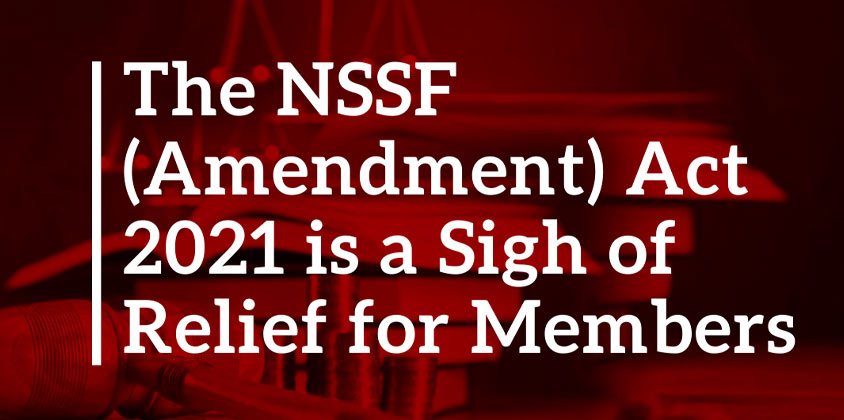The NSSF (Amendment) Act 2021 Brings a Sigh of Relief to Members

On 2nd January 2022, NSSF (Amendment) Act 2021 was assented into law by the President. The New Year gift for some of the over two million workers who save with NSSF ushered in amendments that provide for among others midterm access to savings and compulsory membership by all employees regardless of size of enterprise they are employed in.
Between 2020 and 2021, the Covid-19 pandemic amplified the existing debate for reforms in the pensions sector of Uganda. There have been calls for liberalization of the sector, decentralization of decision making among others. For many employees and employers under the NSSF scheme, the pressing debate revolved around reforms relating to midterm access of savings by some categories of members.
The pandemic opened the NSSF Act and the scheme in general to scrutiny when some members lost their jobs because of the pandemic or could not afford medical care. Initially unapprehensive, NSSF leadership later buckled under the pressure and responded with stopgap interventions such as a moratorium to employers allowing them to remit employee contributions at a later date, and in special cases allowing early access to savings for medical reasons.
However, the calls for reform had already been picked up by a number of stakeholders including workers’ representatives in Parliament and workers unions, as well as civil society advocacy groups. Most notably, Morrison Rwakakamba under Agency for Transformation (AFT) a civil advocacy group represented by Cymbell Advocates and bolstered by other seasoned constitutional litigants like Severino Twinobusingye and John Mary Mugisha (SC) had instituted a petition in the Constitutional Court challenging the constitutionality of the impugned provisions of the NSSF Act. The petition and media debate forced the NSSF (Amendment) Bill onto the floor of Parliament as a matter of urgency to debate the overdue amendments. The debate was broadened to include hitherto unforeseen developments in case of pandemic leading to unique situations of incapacity. The Bill piqued public interest, that of politicians and workers. Coupled with the pains of lockdown measures on white and blue-collar enterprise, the timing could not have been more apt. On 2nd January 2022, the President assented to the NSSF (Amendment) Act 2021 signifying the official coming into force of the reforms and amendments therein. Some of the changes are:
- The provision for mandatory contribution to the scheme by all employees regardless of the size of the enterprise they are employed in. In the past only employees in enterprises with 5 or more employees were required to be members of the scheme however the Amendment has widened the mandatory reach of NSSF. This may have mixed implications for employees and employers, where the latter might decry the increased cost of starting businesses.
- The provision for midterm access to savings by members who are 45 years of age and above, and have made contributions to the fund for at least 10 years, including those members with disabilities above 45 years of age and who have made contributions to the fund for at least 10 years. Midterm access by the latter category is for up to 50% of the savings while midterm access by the former category is restricted to 20% of the savings.
- The provision for voluntary contributions by members over and above the minimum required under law and the provision for self-employed workers to also register and become members under the scheme.
- The provision for a stakeholder board, intended to be more representative of the various stakeholders under the scheme. The stakeholder board is expected to include representatives from workers, labor unions, representation from the (dual regulators) Ministry of Gender, Labour and Social Development and the Ministry of Finance Planning and Economic Development. It is hoped that this amendment will streamline accountability, transparency and mitigate concerns around inclusivity.
It should be noted that the NSSF Scheme is only one of several pension schemes due for reform to improve access, benefits and affordability. The progress made can only be a first step in the right direction to make social security a reality for even more Ugandans.
Download the The NSSF (Amendment) Act 2021



